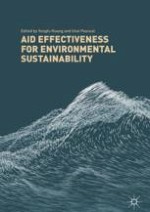2018 | OriginalPaper | Chapter
8. Opportunities and Conditions for Successful Foreign Aid to the Forestry Sector
Authors : Unai Pascual, Eneko Garmendia, Jacob Phelps, Elena Ojea
Published in: Aid Effectiveness for Environmental Sustainability
Publisher: Springer Singapore
Activate our intelligent search to find suitable subject content or patents.
Select sections of text to find matching patents with Artificial Intelligence. powered by
Select sections of text to find additional relevant content using AI-assisted search. powered by
